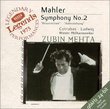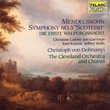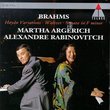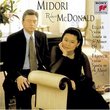| All Artists: Arleen Auger, Dame Janet Baker, City of Birmingham Symphony Orchestra and Chorus Title: Mahler: Symphony No. 2 "Resurrection"; Rattle, Auger, Baker Members Wishing: 1 Total Copies: 0 Label: EMI Classics Release Date: 10/25/1990 Genre: Classical Style: Symphonies Number of Discs: 2 SwapaCD Credits: 2 Other Editions: Mahler Symphony No. 2 UPCs: 077774796224, 077774796255 |
Search - Arleen Auger, Dame Janet Baker, City of Birmingham Symphony Orchestra and Chorus :: Mahler: Symphony No. 2 "Resurrection"; Rattle, Auger, Baker
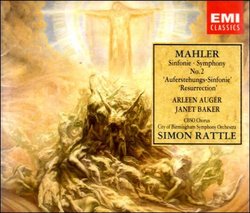 | Arleen Auger, Dame Janet Baker, City of Birmingham Symphony Orchestra and Chorus Mahler: Symphony No. 2 "Resurrection"; Rattle, Auger, Baker Genre: Classical
With its unrestrained, highly personal emotionality, Mahler's music reflects all the extremes of his volatile, complex nature and has always evoked extreme reactions in performers and listeners. Indeed, it seems to encoura... more » |
Larger Image |
CD DetailsSynopsis
Amazon.com essential recording With its unrestrained, highly personal emotionality, Mahler's music reflects all the extremes of his volatile, complex nature and has always evoked extreme reactions in performers and listeners. Indeed, it seems to encourage conductors to express their own rather than the composer's personality, though Mahler, himself a great conductor, filled his scores with copious, detailed performing instructions. No wonder the enormous Mahler discography presents a fascinating variety of interpretations, starting with the many choices of textural emphasis offered by the very richness of the orchestration. Rattle's approach seems oriented toward external effect and innovation. He highlights Mahler's excessive tendencies with extreme contrasts: dynamics go from whispers to crashes; changes of mood and character are highlighted by long pauses; his textural priorities are highly unusual. The first movement (which has a disc to itself) is emphatic, often explosive, the great dissonant climax drawn out to the utmost; the march in the finale is truly infernal, ferocious, theatrical. However, the singers bring warmth and inwardness into the performance: Janet Baker, though her voice has lost some of the bloom of her incomparable 1965 recording under Klemperer, sings with moving simplicity and devout passion; Arleen Auger's voice floats with angelic purity. The choral ending has a broad, sweeping, all-out grandeur. --Edith Eisler Similar CDsSimilarly Requested CDs
|
CD ReviewsAbsolutely the greatest interpretation of this complex work Will Benton | Madison, WI United States | 12/18/2000 (5 out of 5 stars) "I've been a Mahler devotee for most of my life, and this is one of my favorite works of his. I have publically performed two of the Lieder from which Mahler borrowed material for this symphony ("Urlicht" and "St. Antonius von Padua Fischpredigt"), and have written several analysis papers on Mahler's early works. I am also a member of the International Gustav Mahler Gesellschaft. It is not without careful consideration, then, when I say that this is absolutely the finest recording of Mahler's Second available, certainly the finest of the five that I own.Some folks will insist on the flamboyant, over-romanticized Bernstein/NYP or the technically stunning Solti, but neither has the insight into Mahler's music and soul that Rattle does, and neither performance tops this on technical merits either. This is a recording of Mahler, not of some conductor's ego. Bernstein's Mahler, for example, is a whining young Werther, drooping over every jot and tittle, while Solti's Mahler is full of bombast and pomp. The real Gustav Mahler was neither; he was a complex, tortured philosopher and an exacting, demanding artist and conductor. Rattle refuses to fall victim to the common, offensive trap of re-creating Mahler in his own image, and, in this refreshingly honest and technically brilliant reading, shows us the real Mahler. Five stars does not do this work justice; neither does the Rosette awarded it in the Penguin Guide to Compact Discs." The most sensitive performance of this symphony Ofir Shachar | Tel Aviv Israel | 08/18/2000 (5 out of 5 stars) "I've been a great admirer of this symphony for more than 12 years. I have listened to many performances, where orchestras and conductors took the brave and noble journy to bring this masterpiece of post-romantic music to the audience. This performance leaves many of the others behind.Rattle explores Mahler's second symphony "Resurrection" with an unorthodox treatment. I've heard many conductors perform the piece with the standard, almost requested dramatic (and sometimes pathetic) manner. Rattle seeks the more gentle, inner spirit of the symphony. This brings out its most hidden beauty and joy, without neglecting the drama and adventure of it. Certainly the most sensitive performance I've ever heard.Do yourselves a favor: if you're a Mahler buff, or if you have a passion for exciting, dramatic piece of orchestral/vocal music, add this item to your collection. No matter how many times I listen to it - it always leaves me with goose-bumps all through the performance, and the finale makes my eyes moist every time. A small piece of paradise - enjoy it!" Great...with one problem, at least to my ears John Grabowski | USA | 09/20/2002 (4 out of 5 stars) "I love this recording, and in so many ways it is simply spectacular: the gripping opening notes (some feel it too flaccid and not "sharp" enough because Rattle does not hit the diminuendo right away, but it doesn't bother me), the slow, "inquisitive" passage in the basses and celli at the start of the development that seems to be wordlessly wondering something aloud, the truly thunderous first movement climax, the beautifully-felt second movement, the gorgeous brass and hushed singing of the "Urlicht." There are many more examples. But the review below me who says Rattle sometimes loses sight of the overall structure is onto the disc's biggest flaw. This Resurrection doesn't build inevitably towards the resurrection, and I find the last bars, the organ, the chorus, the redemption, underwhelming. There are other recordings that at this point bring actual tears to my eyes. Tears of joy. This recording never has, and I think it's because the last movement is too detached, too clinical. I feel as if Rattle is observing this climactic part of the music from a distance rather than being a participant in the music-making. The choir too is strangely recessed and indistinct, and this effects the emotional impact of the finale. For exampe, while Mehta's recording overall isn't as technically perfect in my opinion (technically both in terms of orchestral technique and recording technique) there's something about it that makes emotions well up--the slow build that leads to redemption in the fouth movement tells you "something wondrous is about to happen." Same with Bernstein (though he seems to try harder and accomplish less), Klemperer and Haitink. There is *humanity* there, whereas here there is the Mahler 2nd under a microscope. Some other reviewers said he focuses on the microscopic aspects at the expense of the overall dramatic build. Maybe that's it. At any rate, I don't *feel* the "Resurrection" at the end, though I've enjoyed many of the points along the way. *Still* recommended for many high points, but you'll want to fortify your collection with other versions. However, with great and epic works like this, multiple versions are often a requirement."
|

 Track Listings (1) - Disc #1
Track Listings (1) - Disc #1


